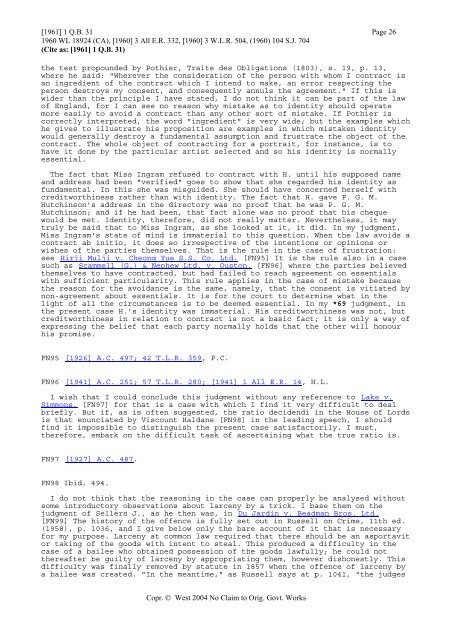Tesco v Constain - Thomson Reuters
Tesco v Constain - Thomson Reuters
Tesco v Constain - Thomson Reuters
Create successful ePaper yourself
Turn your PDF publications into a flip-book with our unique Google optimized e-Paper software.
[1961] 1 Q.B. 31 Page 261960 WL 18924 (CA), [1960] 3 All E.R. 332, [1960] 3 W.L.R. 504, (1960) 104 S.J. 704(Cite as: [1961] 1 Q.B. 31)the test propounded by Pothier, Traite des Obligations (1803), s. 19, p. 13,where he said: "Wherever the consideration of the person with whom I contract isan ingredient of the contract which I intend to make, an error respecting theperson destroys my consent, and consequently annuls the agreement." If this iswider than the principle I have stated, I do not think it can be part of the lawof England, for I can see no reason why mistake as to identity should operatemore easily to avoid a contract than any other sort of mistake. If Pothier iscorrectly interpreted, the word "ingredient" is very wide; but the examples whichhe gives to illustrate his proposition are examples in which mistaken identitywould generally destroy a fundamental assumption and frustrate the object of thecontract. The whole object of contracting for a portrait, for instance, is tohave it done by the particular artist selected and so his identity is normallyessential.The fact that Miss Ingram refused to contract with H. until his supposed nameand address had been "verified" goes to show that she regarded his identity asfundamental. In this she was misguided. She should have concerned herself withcreditworthiness rather than with identity. The fact that H. gave P. G. M.Hutchinson's address in the directory was no proof that he was P. G. M.Hutchinson; and if he had been, that fact alone was no proof that his chequewould be met. Identity, therefore, did not really matter. Nevertheless, it maytruly be said that to Miss Ingram, as she looked at it, it did. In my judgment,Miss Ingram's state of mind is immaterial to this question. When the law avoids acontract ab initio, it does so irrespective of the intentions or opinions orwishes of the parties themselves. That is the rule in the case of frustration:see Hirji Mulji v. Cheong Yue S.S. Co. Ltd. [FN95] It is the rule also in a casesuch as HScammell (G.) & Nephew Ltd. v. Ouston, [FN96] where the parties believedthemselves to have contracted, but had failed to reach agreement on essentialswith sufficient particularity. This rule applies in the case of mistake becausethe reason for the avoidance is the same, namely, that the consent is vitiated bynon-agreement about essentials. It is for the court to determine what in thelight of all the circumstances is to be deemed essential. In my *69 judgment, inthe present case H.'s identity was immaterial. His creditworthiness was not, butcreditworthiness in relation to contract is not a basic fact; it is only a way ofexpressing the belief that each party normally holds that the other will honourhis promise.FN95 H[1926] A.C. 497; 42 T.L.R. 359, P.C.FN96 H[1941] A.C. 251; 57 T.L.R. 280; [1941] 1 All E.R. 14, H.L.I wish that I could conclude this judgment without any reference to HLake v.Simmons, [FN97] for that is a case with which I find it very difficult to dealbriefly. But if, as is often suggested, the ratio decidendi in the House of Lordsis that enunciated by Viscount Haldane [FN98] in the leading speech, I shouldfind it impossible to distinguish the present case satisfactorily. I must,therefore, embark on the difficult task of ascertaining what the true ratio is.FN97 H[1927] A.C. 487.FN98 Ibid. 494.I do not think that the reasoning in the case can properly be analysed withoutsome introductory observations about larceny by a trick. I base them on thejudgment of Sellers J., as he then was, in HDu Jardin v. Beadman Bros. Ltd.[FN99] The history of the offence is fully set out in Russell on Crime, 11th ed.(1958), p. 1036, and I give below only the bare account of it that is necessaryfor my purpose. Larceny at common law required that there should be an asportavitor taking of the goods with intent to steal. This produced a difficulty in thecase of a bailee who obtained possession of the goods lawfully; he could notthereafter be guilty of larceny by appropriating them, however dishonestly. Thisdifficulty was finally removed by statute in 1857 when the offence of larceny bya bailee was created. "In the meantime," as Russell says at p. 1041, "the judgesCopr. © West 2004 No Claim to Orig. Govt. Works
















